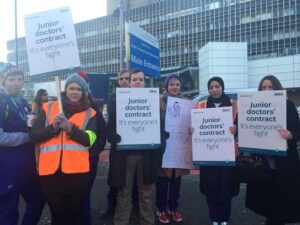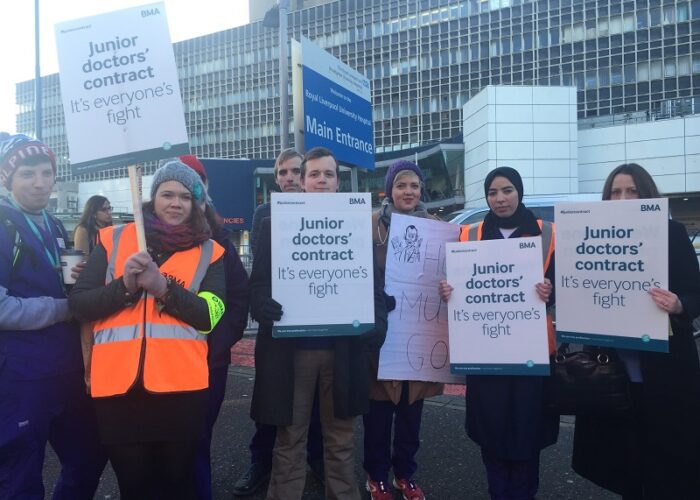
Around 2,000 junior doctors across Merseyside have begun a second 24-hour strike today, after formal talks with the government broke down last month.
Members of the British Medical Association (BMA) throughout England are involved in the industrial action, which is a result of the government’s proposal of a new contract.
Junior doctors – all medics below GP or consultant level – are objecting to plans drawn up by Health Secretary, Jeremy Hunt, which would see changes to create more seven-day services within the NHS.
Part of the new contract included an 11% pay rise in basic pay. However, junior medics have refused to accept Mr Hunt’s proposal to change what constitutes unsociable hours, which would mean Saturday largely being classed as a normal working day.
Deputy Chairman of the Junior Doctors’ Committee, Dr Aaron Borbora, told JMU Journalism: “This is not just a question of pure money, we believe that Saturdays are a special time that we can spend with our families.
“For many of us, this may be the only opportunity we get throughout the week to spend quality time with our family. It is profoundly unfair and that’s why we cannot agree to it.”
Currently, junior doctors receive a premium rate of pay for working weekends. In November, the government said that junior medics would receive time-and-a-half for working Monday to Sunday between 10pm and 7am, and time-and-a-third for any hours worked between 7pm and 10pm on Saturdays.
However, last month, ministers introduced a new offer that would see junior doctors’ receiving a premium rate of pay from 5pm on Saturdays instead of 7pm.
The government has labelled the current contracts, which were introduced in the 1990s, as “outdated” and “unfair”. During an interview with the BBC, Jeremy Hunt accused the BMA’s handling of the lengthy industrial dispute as “totally irresponsible”.
In response to the Health Secretary’s comments, Dr Borbora said: “Jeremy Hunt is the only irresponsible individual here. He has continually misinformed the public. He claimed that patients are more likely to die if they are admitted at a weekend, which is an inaccurate interpretation of the facts.”
Dr Borbora, who is a radiology registrar at Aintree Hospital, added: “We apologise for the inconvenience caused but we feel that the long term threats of this proposed contract are far greater. It would create a demoralised workforce and more professionals may begin to look at working elsewhere, away from the NHS, if the plans are implemented.”

